Related Research Articles

Sheikh Mujibur Rahman, popularly known by the honorific prefix Bangabandhu was a Bangladeshi politician, revolutionary, statesman, activist and diarist. As a politician, Mujib had held continuous positions as president or prime minister from April 1971 until his assassination in August 1975: as president from 1971 to 1972 and briefly from 1975 until his death, and as prime minister from 1972 to 1975. Mujib successfully led the Bangladeshi independence movement and restored the Bengali sovereignty after over two centuries following the Battle of Plassey in 1757, for which he is honoured as the 'Father of the Nation' in Bangladesh. In 2011, the fifteenth constitutional amendment in Bangladesh referred to Sheikh Mujib as the Father of the Nation who declared independence; these references were enshrined in the fifth, sixth, and seventh schedules of the constitution. His Bengali nationalist ideology, socio-political theories, and political doctrines are sometimes called Mujibism.
Independence of Bangladesh was declared on 26 March 1971, celebrated as Independence Day, from Pakistan. The Independence Day of Bangladesh is celebrated on 26 March when Sheikh Mujibur Rahman declared the independence of Bangladesh. The Bangladesh Liberation War started on 26 March and lasted till 16 December 1971 which is celebrated as Victory Day in Bangladesh. There is a dispute along partisan line on who declared the Independence of Bangladesh. The Awami League claim Sheikh Mujibur Rahman while the Bangladesh Nationalist Party claim it was Ziaur Rahman.

The Bangla Academy is the official regulatory body of the Bengali language in Bangladesh. It is an autonomous institution funded by the Government of Bangladesh that fosters the Bengali language, literature and culture, works to develop and implement national language policy and conducts original research in Bengali. Established in 1955, it is located in the Burdwan House in Shahbagh, Dhaka, within the grounds of the University of Dhaka and Suhrawardy Udyan. The Bangla Academy hosts the annual Ekushey Book Fair.
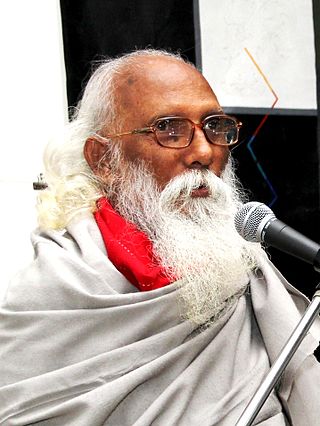
Nirmalendu Goon is a Bangladeshi poet known for his accessible verse. He was awarded Ekushey Padak in 2001 and Independence Day Award by the Government of Bangladesh in 2016. He was also awarded the Bangla Academy Literary Award in 1982.

The first president of Bangladesh, Sheikh Mujibur Rahman, and most of his family were killed during the early hours of 15 August 1975 by a group of Bangladesh Army personnel who invaded his Dhanmondi 32 residence as part of a coup d'état. Minister of Commerce, Khondaker Mostaq Ahmad, immediately took control of the government and proclaimed himself president. The assassination marked the first direct military intervention in Bangladesh's civilian administration-centric politics. 15 August is National Mourning Day, an official national holiday in Bangladesh.
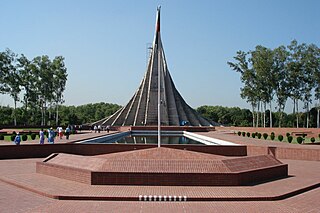
There have been numerous works of art created as a result of the Bangladesh Liberation War. In 1971, a concert was organized by members of the British rock band, The Beatles, in support of Bangladesh. The songs recorded for and broadcast on Swadhin Bangla Betar Kendra are still considered to be the best of Bangladeshi protest songs.
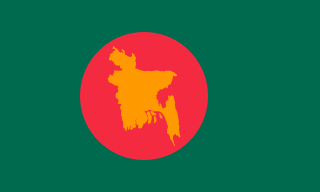
The Independence Day of Bangladesh is celebrated on 26 March as a national holiday in Bangladesh. It commemorates the country's declaration of independence from Pakistan in the early hours of March 26, 1971.

Aminul Islam is a poet and essayist from Bangladesh. He has written 28 books including 23 books of poetry. He has been involved in creative writing for some 25 years.
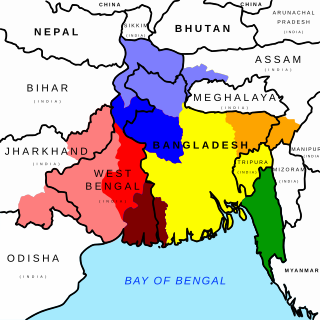
Joy Bangla is a slogan and war cry used in Bangladesh and Indian state of West Bengal to indicate nationalism towards the geopolitical, cultural and historical region of Bengal and Bangamata. It is also recognised as the national slogan of Bangladesh. It translates roughly to "Victory to Bengal" or "Hail Bengal".
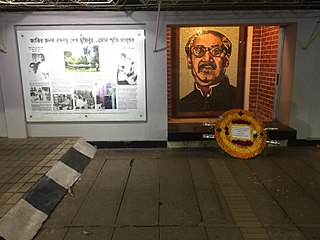
Bangabandhu Memorial Museum, also known as Bangabandhu Bhaban or Dhanmondi 32, located in Dhanmondi, Dhaka, Bangladesh, was the personal residence of Sheikh Mujibur Rahman, who was also called Bangabandhu, the founder and president of Bangladesh. Mujib was assassinated with most members of his family in this residence. In 2009, RAJUK declared the museum a national heritage site.
The non-cooperation movement of 1971 was a historical movement in then East Pakistan by the Awami League and the general public against the military government of Pakistan in March of that year. After the announcement of the suspension of the session of the National Assembly of Pakistan on 1 March, the spontaneous movement of the people started, but officially on the call of Sheikh Mujibur Rahman, the non-cooperation movement started on 2 March and continued until 25 March. The movement lasted for a total of 25 days.
The Dainik Bangla is a Bengali-language daily newspaper in Bangladesh. The newspaper was closed in 1997 and was later revived on 4 September 2022 by an editorial panel led by Nazrul Islam Mazumder and Chowdhury Nafeez Sharafat.
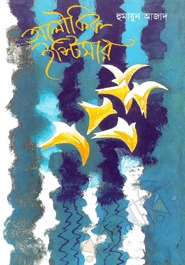
Aulaukik Istimaar is a book which consists of a collection of Bengali poetry by Bangladeshi author Humayun Azad. It was the first book of Azad which was published in 1973 from Khan Brothers and Company, Dhaka. A reprint was published from Agamee Prakashani later. The poems in the book are able to foreshadow the mainstream and style of broad thought in Azad's later life poetry.
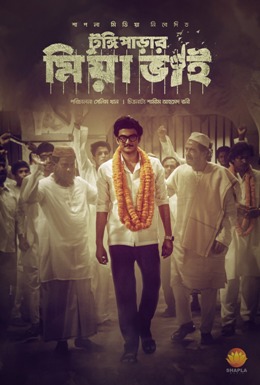
Tungiparar Miya Bhai is a 2021 Bangladeshi biographical feature film. Its director is Selim Khan and producer is Pinky Akter. The film was made under the banner of Story Shapla Media.
Bhat De Haramzada, Noile Manchitro Khabo is a famous Bengali-language Bangladeshi poem written by Rafiq Azad. It is included in his poetry book Simaboddho Jole, Simito Sobuje. Its subject is Bangladesh famine of 1974 that was the cause of food shortage in Bangladesh. The poet mentioned Sheikh Mujibur Rahman in the poem indirectly who is founder of Bangladesh. It has 33 rhythmic lines.

Rupsha Nodir Banke is a 2020 Bangladeshi biographical full-length film. This Bangladesh government-funded film is written and directed by Ekushey Padak-winning filmmaker Tanvir Mokammel. The main thrust of the film is the involvement of events in the historical life of a supporter of left-wing politics at different ages. In the political biography of the main character of the film called Manabratan Mukhopadhyay, various historical events that happened in Bangladesh from 1930 to 1971 are presented. Khairul Alam Sabuj, Tawsif Saadman Turjo and Zahid Hasan Sobhan have acted according to the age of Manabratan Mukhopadhyay.
Khan Shamsur Rahman, also known as Khan Mohammad Shamsur Rahman, was a Bangladeshi diplomat and the first ambassador of Bangladesh to the Soviet Union. He was the High Commissioner of Bangladesh to India.
References
- ↑ Khorshed, Iqbal (3 August 2021). "শব্দে ও ছন্দে পিতার মুখ" [Father's face in words and rhythms]. Jugantor (in Bengali). Archived from the original on 2 August 2021. Retrieved 31 July 2022.
- 1 2 3 Gourik, Girish (21 June 2020). "নির্মলেন্দু গুণের সাক্ষাৎকার" [Interview with Nirmalendu Goon]. Bangla Tribune (in Bengali). Archived from the original on 1 August 2022. Retrieved 31 July 2022.
- ↑ Ahmed, Farid. "হুলিয়া কবিতার জন্ম কথা" [Huliya is the birth of poetry]. Banglakagoj.com (in Bengali). Archived from the original on 5 August 2022. Retrieved 5 August 2022.
- ↑ "হুলিয়া Meaning In Bengali". Sobdartho.com (in Bengali). Archived from the original on 1 August 2022. Retrieved 1 August 2022.
- 1 2 3 "নির্মলেন্দু গুণের কবিতা: তিন কবির বিশ্লেষণ" [Poems of Nirmalendu Goon: An Analysis of Three Poets]. Samakal (in Bengali). 17 June 2022. Archived from the original on 17 June 2022. Retrieved 1 August 2022.
- ↑ Biswas, Milton (21 June 2020). "নির্মলেন্দু গুণের কবিতায় রাজনীতির নিজস্ব স্বর" [Nirmalendu Goon's own tone of politics]. Ittefaq (in Bengali). Archived from the original on 1 August 2022. Retrieved 31 July 2022.
- ↑ Kader, Abedin (15 April 2022). "শামস আল মমীনের কবিতা: ভিন্ন স্বরের, ভিন্ন কাব্য-ভাষার ছবি" [The Poetry of Shams Al Momin: Pictures of Different Tones, Different Poetics]. Bdnews24.com (in Bengali). Archived from the original on 5 August 2022. Retrieved 5 August 2022.
- 1 2 "আমার হুলিয়া, আমার বঙ্গবন্ধু" [My Huliya, my Bangabandhu]. Amader Shomoy (in Bengali). 13 August 2019. Archived from the original on 14 September 2019. Retrieved 1 August 2022.
- 1 2 Alauddin, Raju (15 August 2015). "নির্মলেন্দু গুণ: "প্রথমদিন শেখ মুজিব আমাকে 'আপনি' করে বললেন"" [Nirmalendu Goon: "Sheikh Mujib addressed me as 'you' on the first day"]. Bdnews24.com (in Bengali). Archived from the original on 1 August 2022. Retrieved 1 August 2022.
- ↑ Khan, Rafiqullah (21 June 2014). "গুণের কবিতা: সংগ্রামের কবিতা" [Poems of Goon: Poems of Struggle]. Banglanews24.com (in Bengali). Archived from the original on 5 August 2022. Retrieved 5 August 2022.
- ↑ Saad, Saimum (29 May 2021). "হুলিয়া: ফরীদিকে মঞ্চে খুঁজে পেয়েছিলেন তানভীর মোকাম্মেল" [Huliya: Faridi was found on stage by Tanvir Mokammel]. Bdnews24.com (in Bengali). Archived from the original on 12 June 2021. Retrieved 1 August 2022.
